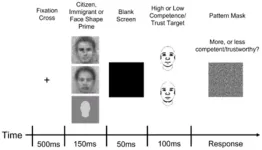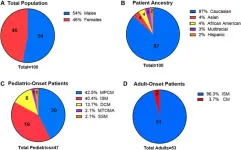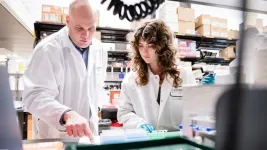(Press-News.org) The COVID-19 pandemic significantly widened existing economic and health disparities between wealthy and low-income countries and slowed progress toward health-related Sustainable Development Goals (SDGs), according to a new study published July 24, 2024, in the open-access journal PLOS ONE by Wanessa Miranda of Federal University of Minas Gerais, Brazil, and colleagues.
The global SDGs were established in 2015 as a wide and integrated agenda with themes ranging from eradicating poverty and promoting well-being to addressing socioeconomic inequalities. However, the COVID-19 pandemic is known to have delivered a devastating blow to global health, with large economic repercussions.
The new study investigated the potential impact of these economic disruptions on progress toward health-related SDGs. The research team used data from the official United Nations SDG database and analyzed the associations between well-being, income levels, and other key socioeconomic health determinants. A yearly model was extrapolated to predict trends between 2020 and 2030 using a baseline projection as well as a post-COVID-19 scenario.
The study estimated average economic growth losses in the wake of the COVID-19 pandemic as 42% and 28% for low and lower middle-income countries and 15% and 7% in high- and upper middle-income countries. These economic disparities are projected to drive global health inequalities in the themes of infectious disease, injuries and violence, maternal and reproductive health, health systems coverage and neonatal and infant health. Overall, low-income countries can expect an average progress loss of 16.5% across all health indicators, whereas high-income countries can expect losses as low as 3%. Individual countries, such as Turkmenistan and Myanmar, have estimated a loss of progress which is as much as nine times worse than the average loss of 8%. The most significant losses are seen in Africa, the Middle East, Southern Asia, and Latin America.
The authors conclude that the impact of the pandemic has been highly uneven across global economies and led to heightened inequalities globally, particularly impacting the health-related targets of the 2030 SDG Agenda.
The authors add: “The COVID-19 pandemic significantly widened existing economic and health disparities between wealthy and low-income countries and slowed progress toward health-related Sustainable Development Goals (SDGs). Overall, low-income countries can expect an average progress loss of 16.5% across all health indicators, whereas high-income countries can expect losses as low as 3%.”
#####
In your coverage please use this URL to provide access to the freely available article in PLOS ONE: https://journals.plos.org/plosone/article?id=10.1371/journal.pone.0305955
Citation: Silveira F, Miranda W, Sousa RPd (2024) Post-COVID-19 health inequalities: Estimates of the potential loss in the evolution of the health-related SDGs indicators. PLoS ONE 19(7): e0305955. https://doi.org/10.1371/journal.pone.0305955
Author Countries: Brazil
Funding: The authors received no specific funding for this work. The funders had no role in study design, data collection and analysis, decision to publish, or preparation of the manuscript.
END
The COVID-19 pandemic slowed progress towards health-related Sustainable Development Goals and increased inequalities
Study analyzed 7 major health themes across 185 countries before and after the COVID-19 pandemic
2024-07-24
ELSE PRESS RELEASES FROM THIS DATE:
Even people who harbor positive sentiments toward immigrants imagine immigrants' faces as less trustworthy and less competent than US citizens' faces
2024-07-24
Even people who harbor positive sentiments toward immigrants imagine immigrants' faces as less trustworthy and less competent than US citizens' faces
###
Article URL: https://journals.plos.org/plosone/article?id=10.1371/journal.pone.0306872
Article Title: Intergroup evaluative bias in facial representations of immigrants and citizens in the United States
Author Countries: USA
Funding: This work was facilitated by the National Science Foundation Division of Behavioral and Cognitive Sciences, grant #1764097 awarded to ART and grant #2215236 awarded to ...
Southern Ocean absorbing more CO2 than previously thought, study finds
2024-07-24
New research led by the University of East Anglia (UEA) and Plymouth Marine Laboratory (PML) has found that the Southern Ocean absorbs more carbon dioxide (CO2) than previously thought.
Using direct measurements of CO2 exchange, or fluxes, between the air and sea, the scientists found the ocean around Antarctica absorbs 25% more CO2 than previous indirect estimates based on shipboard data have suggested.
The Southern Ocean plays a major role in absorbing CO2 emitted by human activities, a process vital for controlling the Earth's climate. However, there are big uncertainties ...
Saharan dust regulates hurricane rainfall
2024-07-24
Giant plumes of Sahara Desert dust that gust across the Atlantic can suppress hurricane formation over the ocean and affect weather in North America.
But thick dust plumes can also lead to heavier rainfall – and potentially more destruction – from landfalling storms, according to a July 24 study in Science Advances. The research shows a previously unknown relationship between hurricane rainfall and Saharan dust plumes.
“Surprisingly, the leading factor controlling hurricane precipitation is not, as traditionally thought, sea surface temperature or humidity in the atmosphere. Instead, it’s Sahara dust,” said the corresponding ...
Fighting leukemia by targeting its stem cells
2024-07-24
Acute myeloid leukaemia is one of the deadliest cancers. Leukaemic stem cells responsible for the disease are highly resistant to treatment. A team from the University of Geneva (UNIGE), University Hospital of Geneva (HUG), and Inserm has made a breakthrough by identifying some of the genetic and energetic characteristics of these stem cells, notably a specific iron utilisation process. This process could be blocked, leading to the death or weakening of these stem cells without affecting healthy cells. These results, published in Science Translational Medicine, pave the way for new therapeutic strategies.
Acute ...
NASA’s Webb images cold exoplanet 12 light-years away
2024-07-24
An international team of astronomers using NASA’s James Webb Space Telescope has directly imaged an exoplanet roughly 12 light-years from Earth. The planet, Epsilon Indi Ab, is one of the coldest exoplanets observed to date.
The planet is several times the mass of Jupiter and orbits the K-type star Epsilon Indi A (Eps Ind A), which is around the age of our Sun, but slightly cooler. The team observed Epsilon Indi Ab using the coronagraph on Webb’s MIRI (Mid-Infrared Instrument). Only a few tens of exoplanets have been directly imaged previously by space- and ground-based observatories.
“Our prior observations of this system have been more indirect measurements ...
Prevalence and impact of the KIT M541L variant in patients with mastocytosis
2024-07-24
“This study uniquely examines the prevalence and impact of the KIT M541L variant in both adult and pediatric patients with mastocytosis further stratified by disease variant.”
BUFFALO, NY- July 24, 2024 – A new research paper was published in Oncotarget's Volume 15 on July 22, 2024, entitled, “Prevalence and impact of the KIT M541L variant in patients with mastocytosis.”
Activating mutations in KIT, particularly D816V, have been associated with mastocytosis. Additionally, expression of heterozygous KIT M541L has been primarily ...
Experts outline considerations to deploy AI in radiology
2024-07-24
Artificial Intelligence (AI) tools can play a key role in medical imaging if radiologists trust in their design, deploy them with adequate training and establish clear guidelines regarding clinical accountability, according to a recently published Special Report in Radiology: Artificial Intelligence, a journal of the Radiological Society of North America (RSNA).
RSNA and the Medical Image Computing and Computer Assisted Intervention (MICCAI) Society have led a series of joint panels and seminars focused on the present impact and future directions of AI in radiology. These conversations ...
Johns Hopkins Medicine’s Center for Inherited Disease Research renews 7-year award for up to $98 million
2024-07-24
FOR IMMEDIATE RELEASE
With renewed funding of up to $98.8 million for seven years, Johns Hopkins Medicine scientists will continue to be a worldwide resource for discovering the genes and their variations that contribute to human disease.
Leaders of the Johns Hopkins Center for Inherited Disease Research, established in 1996, received the fourth consecutive renewal for up to $98,880,900 in funds from a consortium of 10 institutes at the National Institutes of Health. The seven-year award is divided between ...
Preventing brain damage in preterm babies
2024-07-24
SAN FRANCISCO—Mark Petersen, MD, has seen firsthand the devastating effects of brain bleeds in premature babies. It’s an exceedingly common condition that affects up to 20 percent of infants born before 28 weeks of gestation, bringing an increased risk for developmental delays and autism.
“As a neonatologist and neuroscientist, it’s frustrating that we don’t have any treatments to counteract the harmful effects of bleeding in the developing brain, even though we know it often leads to lasting problems,” says Petersen, director ...
JNM maintains strong metrics in 2023 Journal Citation Reports
2024-07-24
Reston, VA—The Journal of Nuclear Medicine (JNM)—the flagship publication of the Society of Nuclear Medicine and Molecular Imaging—has maintained its status as one of the top medical imaging journals worldwide, according to new data just released in Clarivate's 2023 Journal Citation Reports. With an impact factor of 9.1, JNM saw increases in its five-year impact factor, journal citation indicator, and article influence score, among other categories.
“This is an exciting time for nuclear medicine, with ground-breaking advances in molecular imaging, theranostics, artificial intelligence, and other areas,” said Johannes Czernin, MD, ...
LAST 30 PRESS RELEASES:
Antarctica sits above Earth’s strongest “gravity hole.” Now we know how it got that way
Haircare products made with botanicals protects strands, adds shine
Enhanced pulmonary nodule detection and classification using artificial intelligence on LIDC-IDRI data
Using NBA, study finds that pay differences among top performers can erode cooperation
Korea University, Stanford University, and IESGA launch Water Sustainability Index to combat ESG greenwashing
Molecular glue discovery: large scale instead of lucky strike
Insulin resistance predictor highlights cancer connection
Explaining next-generation solar cells
Slippery ions create a smoother path to blue energy
Magnetic resonance imaging opens the door to better treatments for underdiagnosed atypical Parkinsonisms
National poll finds gaps in community preparedness for teen cardiac emergencies
One strategy to block both drug-resistant bacteria and influenza: new broad-spectrum infection prevention approach validated
Survey: 3 in 4 skip physical therapy homework, stunting progress
College students who spend hours on social media are more likely to be lonely – national US study
Evidence behind intermittent fasting for weight loss fails to match hype
How AI tools like DeepSeek are transforming emotional and mental health care of Chinese youth
Study finds link between sugary drinks and anxiety in young people
Scientists show how to predict world’s deadly scorpion hotspots
ASU researchers to lead AAAS panel on water insecurity in the United States
ASU professor Anne Stone to present at AAAS Conference in Phoenix on ancient origins of modern disease
Proposals for exploring viruses and skin as the next experimental quantum frontiers share US$30,000 science award
ASU researchers showcase scalable tech solutions for older adults living alone with cognitive decline at AAAS 2026
Scientists identify smooth regional trends in fruit fly survival strategies
Antipathy toward snakes? Your parents likely talked you into that at an early age
Sylvester Cancer Tip Sheet for Feb. 2026
Online exposure to medical misinformation concentrated among older adults
Telehealth improves access to genetic services for adult survivors of childhood cancers
Outdated mortality benchmarks risk missing early signs of famine and delay recognizing mass starvation
Newly discovered bacterium converts carbon dioxide into chemicals using electricity
Flipping and reversing mini-proteins could improve disease treatment
[Press-News.org] The COVID-19 pandemic slowed progress towards health-related Sustainable Development Goals and increased inequalitiesStudy analyzed 7 major health themes across 185 countries before and after the COVID-19 pandemic






